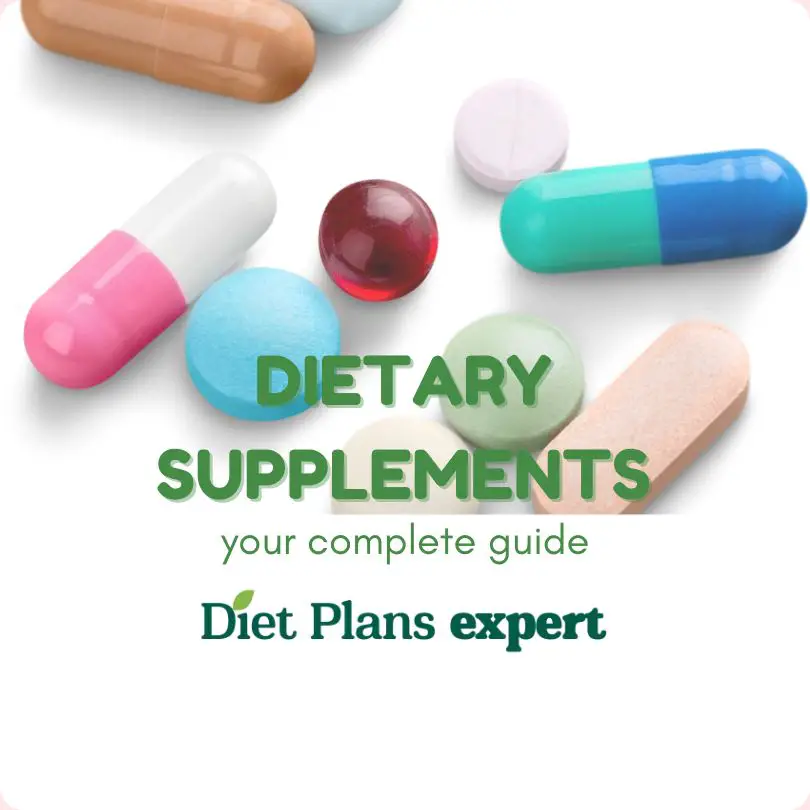
Dietary supplements are a popular way to improve health and well-being. However, with so many different supplements on the market, it can be difficult to know where to start. This guide will provide you with the essential information you need to make informed decisions about dietary supplements.
In this post, we will discuss the following topics:

dietary supplements
Photo by Daily Nouri on Unsplash
Dietary supplements are products that are intended to supplement the diet and provide nutrients that may not be obtained through food alone. They can come in a variety of forms, including pills, capsules, powders, liquids, and gummies.
Dietary supplements can contain a wide range of ingredients, including:
Some supplements are designed to target specific health conditions, while others are more general in their purpose. For example, there are supplements that are specifically designed to boost the immune system, improve heart health, or reduce stress. There are also supplements that are designed to provide general nutritional support.
It is important to note that dietary supplements are not regulated by the FDA in the same way that medications are. This means that there is no guarantee of the safety or effectiveness of dietary supplements. It is important to do your research before taking any dietary supplements, and to talk to your doctor before taking any new supplements.
Here are some additional things to keep in mind about dietary supplements:
If you are considering taking dietary supplements, it is important to do your research and talk to your doctor. By following these tips, you can help ensure that you are using dietary supplements safely and effectively.
A table showing different types of dietary supplements:
| Type of Supplement | Examples | Benefits |
|---|---|---|
| Vitamins | Vitamin A, vitamin C, vitamin D, vitamin E, vitamin K, thiamin, riboflavin, niacin, vitamin B6, folate, vitamin B12, biotin, pantothenic acid | Help the body function properly, boost the immune system, and protect against chronic diseases |
| Minerals | Calcium, iron, magnesium, zinc, selenium, copper, manganese, chromium, molybdenum, chloride, sodium, and potassium | Help build strong bones, regulate blood sugar levels, and support the immune system |
| Herbs and botanicals | Echinacea, ginger, garlic, ginkgo biloba, St. John’s wort | May help boost the immune system, relieve pain, and improve cognitive function |
| Amino acids | Tryptophan, glutamine, lysine | Help build muscle, repair tissue, and produce energy |
| Probiotics | Lactobacillus acidophilus, Bifidobacterium bifidum | Help improve gut health and boost the immune system |
| Prebiotics | Inulin, fructooligosaccharides | Help feed the beneficial bacteria in the gut |
| Omega-3 fatty acids | EPA, DHA | Help reduce inflammation, improve heart health, and protect against cognitive decline |
It is important to note that dietary supplements are not regulated by the FDA in the same way that food and drugs are. This means that there is no guarantee of safety or effectiveness. It is always best to talk to your doctor before taking any dietary supplements, especially if you are pregnant, breastfeeding, or have any underlying health conditions.
Dietary supplements work by providing the body with nutrients that it may not be getting from food alone. These nutrients can help the body function properly and may also have health benefits.
For example, vitamin D is a nutrient that is essential for bone health. If you are not getting enough vitamin D from your diet, you may be at risk for developing osteoporosis. Taking a vitamin D supplement can help you get the amount of vitamin D you need to maintain strong bones.
Another example is fish oil. Fish oil is a good source of omega-3 fatty acids, which have been shown to have a number of health benefits, including reducing inflammation and improving heart health. If you do not eat fish regularly, taking a fish oil supplement can help you get the omega-3 fatty acids you need.
The way dietary supplements work depends on the specific nutrient or ingredient they contain. Some nutrients, such as vitamins and minerals, are absorbed into the bloodstream and distributed throughout the body. Other nutrients, such as herbs and amino acids, may work by interacting with specific enzymes or receptors in the body.
It is important to note that the effects of dietary supplements can vary from person to person. Some people may experience significant benefits from taking dietary supplements, while others may not experience any benefits at all.
If you are considering taking dietary supplements, it is important to talk to your doctor first. Your doctor can help you determine if dietary supplements are right for you and can recommend specific supplements that may be beneficial for your health.
Here are some additional things to keep in mind about how dietary supplements work:
By following these tips, you can help ensure that you are using dietary supplements safely and effectively.

Food supplements
There are many potential benefits of taking dietary supplements. Some of the most common benefits include:
It is important to note that the benefits of dietary supplements can vary from person to person and depend on the specific supplement that is taken. It is also important to talk to your doctor before taking any dietary supplements, especially if you are taking any medications or have any underlying health conditions.
Here are some additional things to keep in mind about the benefits of dietary supplements:
By following these tips, you can help ensure that you are getting the most out of dietary supplements.
While dietary supplements can offer potential benefits, there are also some risks associated with their use. Some of the most common risks include:
It is important to weigh the potential benefits and risks of dietary supplements before taking them. If you are considering taking dietary supplements, it is important to talk to your doctor first. Your doctor can help you determine if dietary supplements are right for you and can recommend specific supplements that may be beneficial for your health.
Here are some additional things to keep in mind about the risks of dietary supplements:
By following these tips, you can help minimize the risks of taking dietary supplements.
If you are considering taking dietary supplements, there are a few things you can do to choose them safely:
Additional things to keep in mind when choosing dietary supplements:
By following these tips, you can help protect yourself from unsafe and ineffective dietary supplements.
Dietary supplements can be a safe and effective way to improve health and well-being. However, it is important to choose supplements wisely and to talk to your doctor before taking any new supplements. By following the tips in this blog post, you can help ensure that you are using dietary supplements safely and effectively.
Here are the key points to remember:
By following these tips, you can help ensure that you are using dietary supplements safely and effectively.
Read this post for more information about healthy eating tips:
Reference: Code of Federal Regulations book
